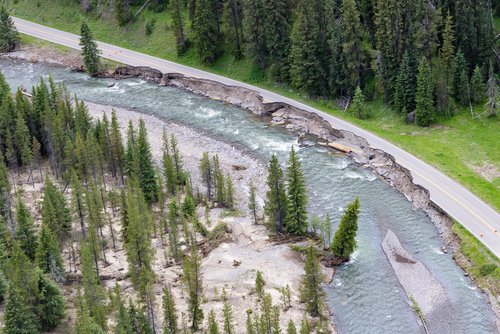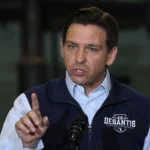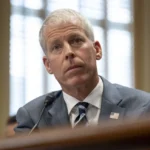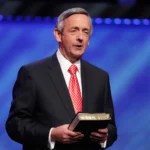Push Grows to “Plow the Plug” (Part 2)
Groups search for solutions to dispute about public road access
- Published In: Other News & Features
- Last Updated: Jan 22, 2023

Some snowmobile riders oppose plowing a section of road straddling the Wyoming/Montana border, saying it serves as a vital trail between backcountry sledding areas. Most area residents want the road plowed to allow for auto access. (Courtesy photo from Montana Office of Tourism and Business Development)
By Ruffin Prevost
Special to the Wyoming Truth
CODY, Wyo. — For Yellowstone National Park visitors arriving in the peak of summer, a 15-minute wait at a busy entrance gate can be a frustrating and disheartening delay. For Bob Richard, the wait to get in during the winter has lasted over four decades.

A former Yellowstone Park ranger who has worked as a tour guide for 44 years, Richard has long sought to lead visitors from Cody through the park’s Northeast Entrance near Cooke City, Mont. to watch wolves and other winter wildlife in Yellowstone’s famed Lamar Valley.
But since the 1980s, an eight-mile section of U.S. Highway 212 that is evenly divided by the Wyoming/Montana border has remained intentionally unplowed in the winter. It is used mainly by snowmobile riders as a connector trail between two vast backcountry snowmobile areas.
Richard tried to get the so-called “plug” plowed around 2000, when he was president of the Cody Country Chamber of Commerce. Snowmobile riders objected, citing division among Cooke City residents over the issue, so nothing changed.
Now, Richard is among an overwhelming majority of travel and tourism industry leaders in Cody, Cooke City and the nearby Montana tourist towns of Red Lodge and Silver Gate who are renewing the push to plow the plug.
“It can be a win-win for everybody,” said Richard, who has worked with members of the Park Access Recommendation Committee (PARC), a group formed to support plowing.
Not all snowmobile riders oppose plowing the plug, and some say they would prefer it plowed. Others—along with some skiers, ice climbers and other outdoor enthusiasts—don’t want it plowed at all, citing the town’s “splendid isolation” in the winter.
Ben Zavora, a member of the opposition group Protect Our Plug (POP), said in an email that Cooke City’s “vital snowmobile and ski economy depend on keeping Highway 212 unplowed until the creation of an equivalent replacement” trail, and two parking lots approved by the U.S. Forest Service are built. That process could take two to five years.

Zavora is co-owner of Beartooth Powder Guides, which caters to backcountry skiers who are looking to avoid crowds and enjoy Cooke City’s seclusion. He cautions that additional tourist traffic from autos could pose a problem for unincorporated Cooke City, which has no local law enforcement and limited emergency services.
“We do not have a tow truck in this town anymore,” Zavora said.
That’s another reason to plow the plug, said PARC member Joelle Passarello. She needed her car towed in December, shortly after the plug was closed to auto traffic, and couldn’t find any willing Montana shops in Bozeman or Livingston. If the plug were plowed, she could have called Montana trucks in Billings and Red Lodge, or in Cody, she said.
Lack of trust between neighbors
Zavora said PARC members sought support for plowing following flood-related road closures last summer by “implying that we would be without food, fuel and other amenities because of the chance the Yellowstone roads were not repaired on time.” He said some locals were “duped” into signing a petition, but did not provide names of those who were “regretful” after signing.
Passarello points to recent difficulties and increased expenses for propane deliveries this winter that resulted in temporary closures for two major businesses. Gasoline and diesel deliveries have also been a problem, said Passarello, who manages a Cooke City gas station.

PARC members accuse POP leaders of deceptively listing out-of-town residents and businesses among their supporters, and doubt the group’s sincerity in seeking parking and trail accommodations. Snowmobilers have opposed plowing for decades, and their latest overtures are stalling tactics, plowing advocates contend. There is no trust between the groups—all neighbors in a tiny community—and neither side is sitting down to talk.
Three separate independent surveys have shown a broad majority of Cooke City residents want the road plowed, and an analysis by the Wyoming Truth of supporters listed by both groups shows an overwhelming majority of residents supporting PARC.
But Montana Gov. Greg Gianforte has been reluctant to address the issue, with staffers citing a “lack of consensus” among residents. Wyoming officials are reluctant to move forward on the matter until Montana leaders do.
Richard said tour operators would relish the chance to bring busloads of overnight visitors to Cooke City, and that plowing would undoubtedly be a major boost to the regional winter economy.
A study proposed Thursday by the Cody-based Park County Travel Council could help shed light on the issue, possibly even providing a path toward a solution.
The Council plans to allocate approximately $50,000 from state lodging tax revenues to fund a study on how to enhance all aspects of winter recreation in the area—including hiking, skiing, ice climbing and snowmobiling—as well as the best options for creating parking and a new sledding trail. Initial discussions with counterparts from Montana’s five-county Yellowstone Country tourism board suggest that the addition of some Treasure State matching funds could make the study a cooperative effort.
If the past is prologue, finding a solution that satisfies most everyone is unlikely.
But Bert Miller, a POP member and snowmobiler from Cody who has long opposed plowing, says a solution is possible.
“I’m not telling you it’s going to be easy, but I think we can do it,” Miller said. “People can move mountains if they come together.”
DISCLOSURE: Ruffin Prevost is a member of the Park County Travel Council board of directors. The organization does not have a position on plowing the plug.













